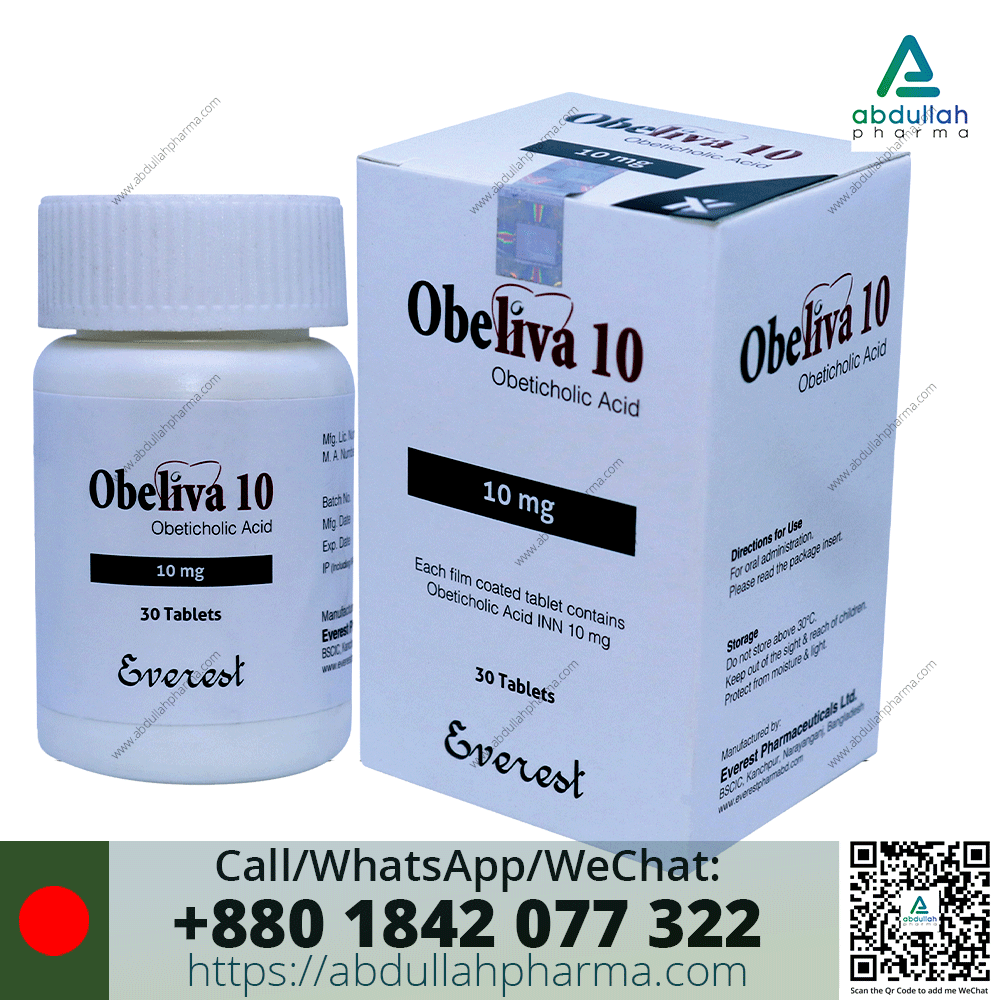Obeliva Tablet
Indications
Therapeutic Class
Pharmacology
Dosage & Administration
Starting Dosage: The recommended starting dosage of Obeticholic Acid is 5 mg orally once daily in adult patients who have not achieved an adequate biochemical response to an appropriate dosage of Ursodeoxycholic Acid (UDCA) for at least 1 year or are intolerant to UDCA.
Dosage Titration: If an adequate reduction in alkaline phosphatase (ALP) and/or total bilirubin has not been achieved after 3 months of Obeticholic Acid 5 mg once daily, and the patient is tolerating Obeticholic Acid, increase the dosage of Obeticholic Acid to 10 mg once daily.
Maximum Dosage: The maximum recommended dosage of Obeticholic Acid is 10 mg once daily.
Management of Patients with Intolerable Pruritus on Obeticholic Acid: For patients with intolerable pruritus on Obeticholic Acid, consider one or more of the following:
Add an antihistamine or bile acid binding resin. Reduce the dosage of Obeticholic Acid to:
- 5 mg every other day, for patients intolerant to 5 mg once daily
- 5 mg once daily, for patients intolerant to 10 mg once daily
Temporarily interrupt Obeticholic Acid dosing for up to 2 weeks followed by restarting at a reduced dosage
Increase the dosage of Obeticholic Acid to 10 mg once daily, as tolerated, to achieve optimal response. Consider discontinuing Obeticholic Acid treatment in patients who continue to experience persistent, intolerable pruritus.
Interaction
Bile Acid Binding Resins: Bile acid binding resins such as cholestyramine, colestipol, or colesevelam adsorb and reduce bile acid absorption and may reduce the absorption, systemic exposure, and efficacy of Obeticholic Acid. If taking a bile acid binding resin, take Obeticholic Acid at least 4 hours before or 4 hours after taking the bile acid binding resin, or at as great an interval as possible.
Warfarin: The International Normalized Ratio (INR) decreased following co-administration of warfarin and Obeticholic Acid. Monitor INR and adjust the dosage of warfarin, as needed, to maintain the target INR range when co-administering Obeticholic Acid and warfarin.
CYP1A2 Substrates with Narrow Therapeutic Index: Obeticholic Acid may increase the exposure to concomitant drugs that are CYP1A2 substrates. Therapeutic monitoring of CYP1A2 substrates with a narrow therapeutic index.
Contraindications
Side Effects
Pregnancy & Lactation
Precautions & Warnings
The following clinically significant reactions are described:
- Liver-Related Adverse Reactions
- Severe Pruritus
- Reduction in high density lipoprotein-cholesterol (HDL-C)
Special monitoring is essential for the patient with such type of problems
Use in Special Populations
Geriatric Use: No dosage adjustment is recommended in elderly patientless than 65 years of age.
Pediatric Use: Safety and efficacy have not been established in patients younger than 18 years.
Use in Patients with Impaired Renal Function: Obeticholic Acid has not been studied in patients with moderate and severe renal impairment (estimated glomerular filtration rate [eGFR] less than 60 ml/min/1.73 m2). In the population pharmacokinetic analysis, an eGFR greater than 50 ml/min/1.73 m2 did not have a meaningful effect on the pharmacokinetics of Obeticholic Acid and its conjugated metabolites.
Use in Patients with Impaired Hepatic Function: Obeticholic Acid is metabolized in the liver. Plasma exposure to Obeticholic Acid and its active conjugates, increases significantly in patients with moderate to severe hepatic impairment (Child-Pugh Classes B and C).The recommended starting dosage of Obeticholic Acid for moderate (Child-Pugh Class B) and severe (Child-Pugh Class C) hepatic impairment is 5 mg once weekly. If an adequate reduction in ALP and/or total bilirubin has not been achieved after 3 months of Obeticholic Acid 5 mg once weekly, and the patient is tolerating the drug, increase the dosage of Obeticholic Acid to 5 mg twice weekly (at least three days apart) and subsequently to 10 mg twice weekly (at least three days apart) depending on response and tolerability.
Overdose Effects
Storage Conditions
/*54745756836*/













Reviews
There are no reviews yet.